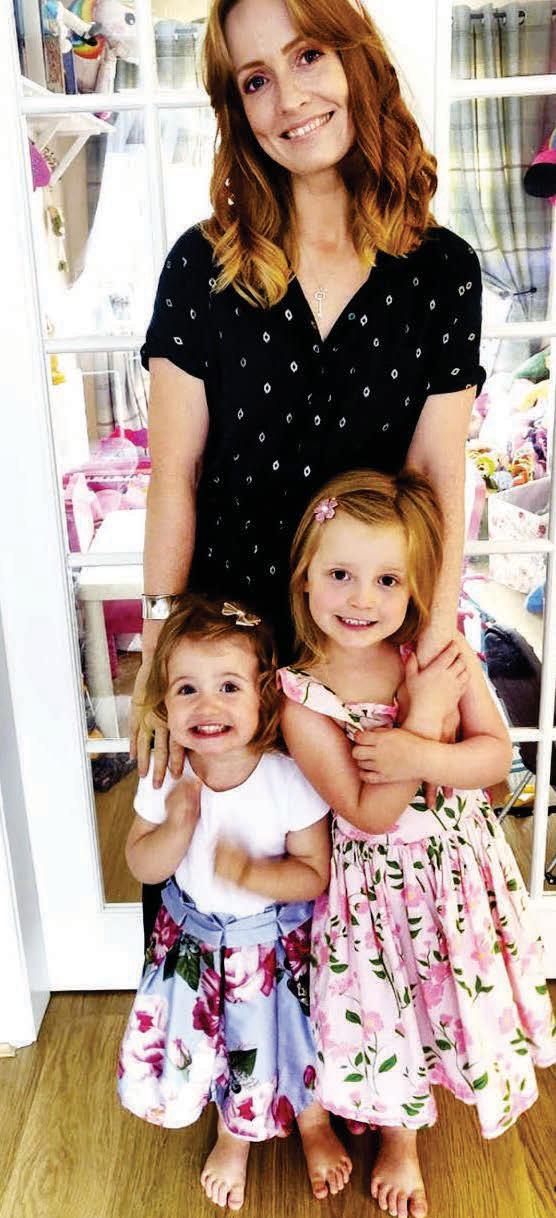Watching my daughters playing together, I felt a lump rise in my throat. They were my pride and joy and I loved every moment of seeing them grow up. But I was terrified that this privilege might be snatched away from me, leaving two little girls without a mother.
After losing my dad Terry to bowel cancer just three days before Christmas 2018, I discovered a few months later that I’d inherited a genetic mutation from him that put me at a higher risk of also developing the disease.
[https://cdn.magzter.com/1583506613/1679985203/articles/WkeGXK96d1680094006878/1017610119.jpg]
Known as Lynch syndrome, carriers have as much as an 80% greater chance of developing bowel cancer, often at a young age. It also increases the risk of a number of other cancers, and as a woman, this meant ovarian and womb cancer.
I was carrying the particularly high risk MSH2 gene, and there was a 50-50 chance that my girls, Minnie and Etta, had inherited it.
The statistics were terrifying, especially after seeing the pain my father had endured. But as hard as it was, I felt empowered to know that I carried this time bomb inside me.
We only found out Dad was a carrier of the mutation when it was too late, despite losing his own father to the disease. He was only 62 when he died. I pondered how things might have been different and how he might have survived had he been tested earlier.
[https://cdn.magzter.com/1583506613/1679985203/articles/WkeGXK96d1680094006878/7089108977.jpg]
‘MY BODY COULD BETRAY ME’
Now I knew what I potentially faced, I knew I could have regular colonoscopies to detect any changes in my bowel and have screenings for endometrial cancers. But that didn’t feel like enough.
“I don’t want to miss a moment with my family,” I told my partner David. “I feel like my body could betray me any day.”
So in May 2019, at the age of 32, I told the doctors I wanted to be put on the waiting list for a hysterectomy.
“You’re still very young,” my consultant said. “We normally wait until Lynch carriers are in their forties.”
“I can’t wait that long,” I said. “I’ve had my children – I need to be alive for them.”
For the next two years, I lived with worry in the back of my mind, not knowing what the next test would show or if the call would come.
In February 2020, David and I got married, partly inspired by the fact that life could be short and we didn’t want to wait. It was fortunate timing as the pandemic hit shortly afterwards and I knew my chances of having elective surgery were significantly delayed. Even my screenings were postponed. I tried to carry on as normally as possible, throwing myself into fundraising for research into Lynch syndrome.
Finally, in November 2021, a call came from the hospital – I had a date for my operation. I’d been waiting so long but I had mixed feelings. My surgery came with risks and if things went wrong, would my girls be left without a mum anyway?
[https://cdn.magzter.com/1583506613/1679985203/articles/WkeGXK96d1680094006878/1000871901.jpg]
That Christmas was especially poignant as I inevitably mourned Dad while worrying that it could be my last one with my family. I also fretted about the recovery.
I’d be pushed into a medical menopause at 34 and would need a long time off my new job as a quality manager. But the alternative wasn’t worth thinking about.
A few days before my surgery, I sat Minnie and Etta down, to try to explain. “Mummy isn’t poorly but has something in her tumm...


